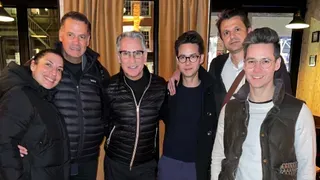October 6, 2022
Review: Cate Blanchett Dominates in Todd Field's Thought-Provoking 'Tár'
C.J. Prince READ TIME: 4 MIN.
In the world of "'Tár'," director Todd Field's first feature since 2006's "Little Children," everything revolves around Lydia Tár (Cate Blanchett), a genius artist and conductor who's achieved countless awards and accolades while working her way into leading the Berlin Philharmonic. At the start of the film, she's preparing for both a major live performance and the release of her autobiography, which amount to two more highlights in a career full of them.
From the lengthy opening sequence, where Tár gets interviewed at The New Yorker Festival, it's easy to get swept up in Field's vision and Blanchett's execution of it. An introduction by the interviewer gets all the necessary exposition out of the way about her, while a montage shows the lengths she goes to in order to prepare for this event. Field's screenplay has Tár drop plenty of names from the world of classical music (the most famous being her mentor Leonard Bernstein), downplay her own groundbreaking achievements as a woman and a lesbian in her field, and take on the assertively casual tone one might expect from a person who knows they're at the top of their craft. It's alienating in all the right ways; here's someone on an entirely different level than the rest of us, and whose mere presence commands us to crane our necks upward in their direction.
Then there's Blanchett herself, an Oscar-winning actress known for her tireless research and dedication to her roles, who imbues every word and mannerism with the sense that it's been rehearsed and mastered several times over. Every interaction she has, whether it's with her wife Sharon (Nina Hoss), her assistant Francesca (Noémie Merlant), one of her benefactors (Mark Strong), her mentor Andris (Julian Glover), or anyone else close enough to her orbit, provides an opportunity to see how Blanchett and her character meticulously establish and maintain the upper hand. It's a great performance, not due to the talent on display but because of how well both actor and role fit each other perfectly.
As much fun as it is to watch "Tár" establish and build upon its portrayal of an upper crust figure in the world of high art, it's another matter altogether when it starts to take itself apart. Field shows his hand eventually, which comes in the form of accusations from a student of Tár's of inappropriate behavior. It turns out that Field's real target is the more recent trend of "cancel culture," or holding people accountable for their misdeeds, which has led to some real-life artists taking a hit to their reputation and careers. The revelation makes some of the film's fundamentals understandable, like setting it within the realm of classical music, where reverence for the old masters still dominates. With "Tár," Field creates a larger than life figure emblematic of the ways we worship and hand over power to great talents, crashes it straight into our ever-changing modern times, then lets the carnage play out in slow motion.
When it comes to the execution of that idea, Field is far better at his wind up than his follow through. He certainly has the right frame of mind in how he tackles it, like how Tár's gender and orientation push the focus on power dynamics' ability to corrupt rather than chalking things up to bad apples, or how the details of her past misdeeds trickle into her insulated universe like small leaks in a dam. Yet the more the film escapes its own vacuum, the less it can sustain its power, so when we come to the rock bottom of Tár's plummet from the top, it comes across as awkward melodrama followed by a cheap punchline. "'Tár'" does such a fantastic job of acting big, it's hard to understand why it has the need to go even bigger.
Still, the last act fumble is only made worse because of the strengths of everything that came before it. At its best, "Tár" is the sort of riveting and measured response to a cultural reckoning, one that acknowledges how we got to this place without ever needing to make up viewers' minds for them. Blanchett deserves all the praise she will get for the work she does here, although the rest of the cast pulls their weight (Hoss' performance is a standout, whose function as a subdued counterbalance to her wife's outward personality is so layered it shouldn't go unnoticed). But as precise and well put together as it may be, that assuredness falls away as soon as it grapples with the ideas and themes it wants to engage with. Maybe the nature of Field's character study just can't go toe to toe with a societal moment that wants to dismantle the problems tied to venerating a talented individual, but it puts on one hell of a show trying to.







